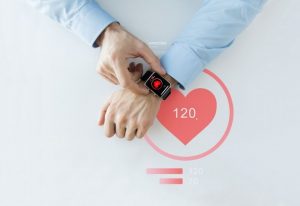The importance of being in tune with your body’s natural circadian rhythms has been known for decades. But it is only recently that scientists have learned the role that smartwatches can play in this endeavor. Tracking circadian rhythms can help you to understand the most ideal times of the day to eat, sleep, take medications and exercise, helping you to feel your best.
What is the Circadian Rhythm?

Your personal circadian rhythm also influences what time of the day that you have the most energy and when you begin to slow down mentally and physically. Your own personal circadian rhythm is known as the chronotype. While some individuals may have the most energy early in the day as they hop out of bed with renewed vigor, others may hit their peak when the sun goes down. Being in tune with your chronotype can help you to harness your peak energy times to get the most done.
A disrupted circadian rhythm can present a host of challenges to your daily life. Some of the most common reasons for this disruption include travel that results in jet lag, getting too much rest, inconsistent sleep patterns, screen time too close to bedtime and shift work. Women may also notice that their circadian rhythm is disrupted just prior to the start of their monthly menstruation cycle.
Importance of Circadian Rhythms to Overall Health and Wellness
There is no doubt that a healthy circadian rhythm translates to a healthier overall lifestyle. A master body clock that is functioning at optimal levels will naturally spill over to the more specific physiological functions. For example, circadian rhythms also control the internal clocks of your heart and liver.
When the circadian rhythm is thrown out of balance, you may notice that your sleep patterns become out of whack. You may also feel lethargic during the day. All of this irregularity will then negatively influence the function of your immune system, putting your overall health at risk.
How Circadian Rhythms Dictate the Best Time of Your Day
Your circadian rhythms influence more than just your sleeping patterns. These inherent rhythms also dictate the best time of the day to perform a number of activities, including when you should exercise if you are looking for specific benefits. For example, working out in the early evening hours has been shown to deliver the most benefits when it comes to regulating your sleep patterns. Evening exercise is also more advantageous in avoiding injury. This is attributed to the fact that the internal body temperature is slightly higher during the later hours of the day.
Exercising during the afternoon has been demonstrated to be the most beneficial if building strength or improving your flexibility is your goal. This is because your muscles perform better and are more flexible in the afternoon hours.
The Role of Smartwatches and Tracking Circadian Rhythms
So how do you know when you should time these daily activities based on your individual circadian rhythm? Emerging research is demonstrating that the trendy smartwatch could be an invaluable tool. In addition to counting steps, telling time and keeping you connected with everyone in your world, this handy electronic device can also be used to help you to understand the ins and outs of your own personal circadian rhythm.

As a result of the data gleaned from the study, researchers have developed the Social Rhythms app for iPhone and Android use. This app allows you to upload your personal wearable data and learn more about changes to your internal master clock.
This information can empower you to make better decisions about when you will be able to get the most out of exercise, the best time for you to eat for specific purposes and helping you to regulate your sleep patterns. The data may also be able to assist when trying to adjust to jet lag or possibly recognize abnormalities in your heart rate to help you to identify specific health risks.
The bottom line is that you will be more equipped to work with your body’s master clock rather than against it if you know more about your circadian rhythm. It could be that tracking circadian rhythms with a smartwatch may prove to be an important tool for learning more about your body’s individual clock for better overall health.







